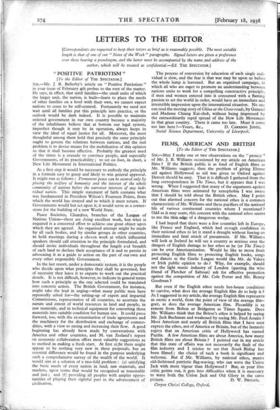LETTERS TO THE EDITOR
[Correspondents are requested to keep their letters as brief as is reasonably possible. The most suitable length is that of one of our "News of the Week" paragraphs. Signed letters are given a preference over those bearing a pseudonym, and the latter must be accompanied by the name, and address of the author, which will be treated as confidential.—Ed. THE SPECTATOR.] "POSITIVE PATRIOTISM" [To the Editor of THE SPECTATOR.] Si,—Mr. J. R. Bellerby's article on "Positive Patriotism" in your issue of February 4th probes to the root of the matter. He says, in effect, that until families—the small units of which the larger unit, the nation, is built—learn to place the needs of other families on a level with their own, we cannot expect nations to cease to be self-centred. Fortunately we need not wait until all families put this principle into practice, or the outlook would be dark indeed. It is possible to maintain ordered government in our own country because a majority of the inhabitants believe that at bottom our legal system, imperfect though it may be in operation, always keeps in view the ideal of equal justice for all. Moreover, the most thoughtful among them hold that precisely the same principle ought to govern the relations between nations, and the real problem is to devise means for the mobilisation of this opinion so that it shall become effective. Probably the greatest need of the times is a crusade to convince people, and especially Governments, of its practicability ; to set on foot, in short, a New Life Movement in International Politics.
As a first step it would be necessary to embody the principle in a formula easy to grasp and likely to win general approval. It might run as follows : Permanent peace can be secured only by placing the welfare of humanity and the interest of the whole community of nations before the narrower interests of any indi- vidual nation. This simple statement of faith contains what was fundamental in President Wilson's Fourteen Points, from which the world has strayed and to which it must return. If Governments would but act upon it, it would serve as a corner- stone for the building of a new World State. , Peace Societies, C,burebes, branches of the League—of Nations Union—these are doing excellent work, but what is required is a concerted effort to achieve one great object upon which they are agreed. An organised attempt might be made by all such bodies, and by similar groups in other countries, to hold meetings during a chosen week at which influential speakers should call attention to the principle formulated, and should invite individuals throughout the length aad breadth of each land to declare their acceptance of it and to persist in advocating it as a guide to action on the part of our own and every other responsible Government. In the last resort, under a democratic system, it is the people who decide upon what principles they shall be governed, but of necessity they leave it to experts to work out the practical details. It is not difficult, however, to indicate in general terms how such a principle as the one selected could be translated into concrete action. The British Government, for instance, might take the lead in urging—what many public men have repeatedly asked for—the setting-up of expert and impartial Commissions, representative of all countries, to ascertain the nature and extent of world resources in land and people, in raw materials, and in technical equipment for converting these materials into suitable condition for human Use. It could press forward, too, with the re-examination of trade' agreements and the machinery for the distribution and exchange of commo- dities, with a view to easing and increasing their flow. A good beginning has already been made by conversations, with America and other countries, and M. van Zeeland'i report on economic collaboration offers most valuable suggestions as to method in making a fresh start At first there might appear to be nothing very new in these prOPosals, but an essential difference would be found in the purpose underlying such a comprehensive survey of the wealth of the world: It would aim at a solution of a two-fold problem : (a) satisfying the basic needs of every nation in land, raw materials, and markets, upon terms that would be recognised as reasonable and just ; and (b) providing all peoples with ampler oppor-T tunities of playing their rightful part in the advancement of civilisation. The process of conversion by education of each single indi- vidual is slow, and the fear is that war may be upon us before the whole lump is leavened. But an organised campaign, in which all who are eager to promote an understanding between nations unite to work for a compelling constructive principle, if men and women _entered into it consumed with a flaming passion to set the world in order, would have an immediate and irresistible impression upon the international situation. No one can read the moving story of China at the Cross-roads, by General and Madame Chiang Kai-shek, without being impressed by the extraordinarily rapid spread of the New Life Movement in that great country. There it came too late. Must it come










































 Previous page
Previous page